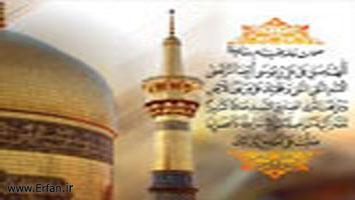
The first dome over the blessed grave was built by Mamun. The present dome, however, was built over the holy grave during the rule of Sultan Muhammad Khudabandeh (b. 1282 A.D.), the Mongol ruler of Iran converted to Shia'ism and ruled Iran from 703-716 A.H. / 1304-1316 A.D. High quality decorative glazed tiles were used for its construction.
The magnificent dome is one of the biggest and the most magnificent specimens of Islamic architecture in the world.
The great golden dome on the tomb consists of two coverings, which includes a false ceiling under the dome. The ceiling above the Zarih is made of stalactite stucco work decorated with variety of coloured glasses is considered as the finest mirror work in the world.
The height of it from the ground to the ceiling is 18.80 meters. The second covering of the dome is completely covered with golden sheets and its height from the ground to the top is 31.20 meters and the circumference of the dome is 42.10 meters.
In the year 932 A.H./ 1525 A.D., Shah Tahmasb I, removed the glazed tiles from the dome and replaced them with golden bricks. During the Uzbek occupation of Mashhad, Abdul Momen Khan attacked the holy shrine and stole all the gold from the dome, however, in the period 1010-1016 A.H./ 1601-1617 A.D., Shah Abbas I, once again coverd the dome with golden bricks.
On the second covering of dome at the 6.74 meters height there is an important and beautiful Qur'anic inscription in blue colour of 1.90 meters breadth on the 42.10 meters circumference of the dome inscribed in Thulth script by Ali Reza Abbasi, the famous calligraphist of Safavid period. The decoration of the dome was carried out in the year 1016 A.H./ 1607 A.D.













